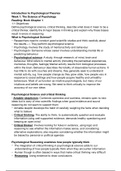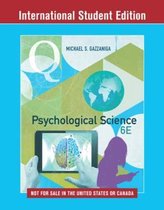Introduction to Psychological Theories
Week 1: The Science of Psychology
Reading: Book Chapter 1
1.1 Objectives:
Define psychological science, critical thinking, describe what does it mean to be a
critical thinker, identify the 8 major biases in thinking and explain why these biases
result in errors in reasoning
What is Psychological Science?
- Researchers need to conduct good scientific studies and think carefully about
the results—> They perform psychological science
- Psychology involves the study of mental activity and behaviour
- Psychologist= Someone whose career involves understanding mental life or
predicting behaviour
- Psychological science: A study, through research, of mind, brain and
behaviour. Mind refers to mental activity (Including the perceptual experiences,
memories, thoughts, feelings) Mental activity results from biological processes
within the brain. Behaviour describes the totality of observable human actions. It
has little to do with couches and dreams, they generally seek to understand
mental activity, e.g. how people change as they grow older, how people vary in
response to social settings and how people acquire healthy and unhealthy
behaviours. Most of us function as intuitive psychologists, but many of our
intuitions and beliefs are wrong. We need to think critically to improve the
accuracy of our own ideas
Psychological Science and critical thinking
- Amiable skepticism: Combines openness and wariness, remains open to new
ideas but is wary of new scientific findings when good evidence and sound
reasoning do not seem to support them
- Amiable skeptic develops the habit of carefully weighing the facts when deciding
what to believe
- Critical thinking: The ability to think, to systematically question and evaluate
information using well-supported evidence; demands healthy questioning and
keeping an open mind
- Critical thinker: Involves looking for holes in evidence, using logic and
reasoning to see whether the information makes sense, and considering
alternative explanations; also requires considering whether the information might
be biased by personal or political agendas
Psychological Reasoning examines how people typically think
- The integration of critical thinking in psychological science adds to our
understanding of how people typically think when they encounter information
- Human though is often biased in ways that make critical thinking very difficult
- Reasoning: Using evidence to draw conclusions
,- Psychological reasoning: Using psychological research to examine how
people typically think, to understand when and why they are likely to draw
erroneous conclusions
- 8 Major biases while using psychological reasoning:
1. Ignoring evidence (Confirmation bias): Your judgement influence your feelings
about the evidence
One factor that contributes to this bias—> Selective sampling of information/
Selective memory, people only search for evidence that support their opinion/
remember information that supports their beliefs
2. Failing to accurately judge source credibility: Examine the sources of the
information we receive
- People are not sure what to believe and whom to believe. Sources need to be
able to justify their claims. People should be wary of appeals to authority, e.g.
when sources refer to the expertise rather than to the evidence
- Advertisers can try to exploit one’s tendencies to reply on expertise —> An
advertisement using a person who appears to be a physician is likely to be more
successful in promoting sales of a drug than one that uses a representative of the
drug company
3. Misunderstanding or not using statistics: People fail to use statistics to interpret
events around them
- Patterns do not happen more frequently than would be expected by chance,
statistics help scientists understand the likelihood that events happen simply by
chance
- e.g. Aunt who has smoked for 40 years and does not have cancer. But the
relationship between smoking and cancer is simply that smokers are more likely
to get cancer, not that every smoker will get cancer
4. Seeing relationships that do not exist (Extremely common): Making something
out of nothing
- Misperception that two events happen at the same time must somehow be
related, believing that events are related when they are not can lead to
superstitions behaviour. Many times they are just coincidence.
5. Using relative comparisons: The framing determines people’s relative
comparisons
- Information that comes first has a strong influence on how people make relative
comparisons; how a question is framed, or presented, also changes how people
answer the question
6. Accepting after-the-fact explanations (Hindsight bias): People expect the world
to make sense, they often come up with explanation for why events happen
- People are less successful at predicting future events
,- Once we know the outcome, we interpret and reinterpret old evidence to make
sense of the outcome
7. Taking mental shortcuts: People often follow simple rules, called heuristics, to
make decisions. These shortcuts often produce reasonably good decisions without
too much effort
- Many heuristics can lead to inaccurate judgements and biased outcomes
- e.g. Your roommate insists on going to Florida for spring break because it is the
first place that come to mind
8. Failing to see our own inadequacies (Self-serving bias): People are motivated to
feel good about themselves, and this motivation affects how they think
- People use various strategies to support their positive views, such as crediting
personal strengths for their successes and blaming outside forces for their
failures
- People interpret information in ways that support their positive beliefs about
themselves
Factor that promotes overconfidence—> People often have difficulty recognising
their own weakness
Why are people unaware of their weakness?
- People are often blissfully unaware of their weaknesses because they cannot
judge those weaknesses at all
- A lack of skill not only prevents people from producing good results, it also
prevents those people from knowing what good results are
1.2 Objectives: Trace the development of psychology since its formal inception in
1879, define the nature debate and the mind problem, identify the major schools of
though that have characterised the history of experimental psychology
The scientific foundations of psychology (Major themes and schools of
thought in the history of psychology):
Culture: The beliefs, values, rules, and customs that exist within a group of people
who share a common language and environment
Nature/Nurture debate: The arguments concerning whether psychological
characteristics are biologically innate or acquired through education, experience,
and culture
- Greek philosophers debated whether an individual’s psychology is attributable
more to nature or to nurture
- Both nature and nurture dynamically interact in human psychological
development
,Mind/body problem: A fundamental psychological issue— Are mind and body
separate and distinct, or is the mind simply the physical brain’s subjective
experience?
- Dualism: refers to the idea that the mind and the body are separate yet inter-
twined—> Nowadays, psychologists reject dualism
- Introspection: A systematic examination of subjective mental experiences that
requires people to inspect and report on the content of their thought
Introspection and Other Methods Led to Structuralism
Structuralism: Based on the idea that conscious experience can be broken down
into its basic underlying components, much as the periodic table breaks down
chemical elements
- The general problem with introspection: Experience is subjective—> Each
person brings a unique perceptual system to introspection, difficult for
researchers to determine whether each participant in a study is employing
introspection similarly; The reporting of the experience changes the experience
—> Introspection is not a reliable method for understanding psychological
processes
e.g. Psychologists should study the pieces that make up the mind
Functionalism addressed the purpose of behaviour
Functionalism: The mind came into existence over the course of human evolution,
it helps humans adapt to environmental demands
e.g. Concerned with the way thought and behaviour help people adapt to their
environments
Major influences on functionalism: the work of the naturalist Charles Darwin
Evolutionary theory: Species change over time—> Some of the changes (Physical
characteristics, skills and abilities) increase individuals’ chances of surviving and
reproducing
It views the history of species in terms of the inherited, adaptive value of physical
characteristics, of mental activity, and of behaviour
Adaptations: The way in which changes passed along generations
Natural selection: The process by which changes that are adaptive are passed
along and those that are not adaptive are not passed along. Species that are better
adapted to their environments will survive. —> Survival of the fittest (Fittest has to
do with reproductive success and survival and not merely strength)
Gestalt Psychology Emphasised Patterns and Context in Learning*
Gestalt theory: Based on the idea that the whole of personal experience
is different from the sum of its constituent elements (In opposition to
structuralism)
e.g. Because the sum is different from the parts, psychologists should
, study the entirety of how we make sense of the world
Freud Emphasized Unconscious Conflicts
- Freud speculated that much of human behaviour is determined by mental
processes operating below the level of conscious awareness
- Unconscious: The subconscious level, the place where mental processes
operate below the level of conscious awareness
Freud believes that unconscious mental forces, often sexual and in conflict,
produce psychological discomfort and in some cases even psychological
disorders
- Psychoanalysis: A method developed by Freud that attempts to bring the
contents of the unconscious into conscious awareness so that conflict can be
revealed
e.g. Studying people’s unconscious conflicts
- Free association: A patient would talk about whatever he or she wanted to for as
long as he or she wanted to. (Freud belief: A person eventually revealed the
unconscious conflicts that caused the psychological problems)
Behaviourism studied environmental forces
- Behaviourism: A psychological approach that emphasises the role of
environment forces in producing observable behaviour
- Watson believes that animals acquire or lean all behaviours thought
environmental experience. Therefore, we need to study the environmental
stimuli —> To predict the animals’ behavioural responses
e.g. Concerned with what people and other animals do, with observable actions
Cognitive approaches emphasised mental activity
- Cognitive psychology: The study of mental functions such as intelligence,
thinking, language, memory, and decision making (the thought process)
e.g. Concerned with the way in which people’s thought affect their behaviour
- Cognitive neuroscience: The study of the neural mechanisms underlying
thought, learning, perception, language and memory
- Social psychology: The study of how people influence other people’s thought,
feelings and actions
e.g. To understand the social contexts in which people act
- Personality psychology: The study of characteristic thoughts, emotions, and
behaviours in people and how they vary across social situations.
Summing up: The Scientific Foundations of Psychology
- Wundt believed it is necessary to reduce mental processes to their constituent,
‘structural’ parts. His approach was known as structuralism.





